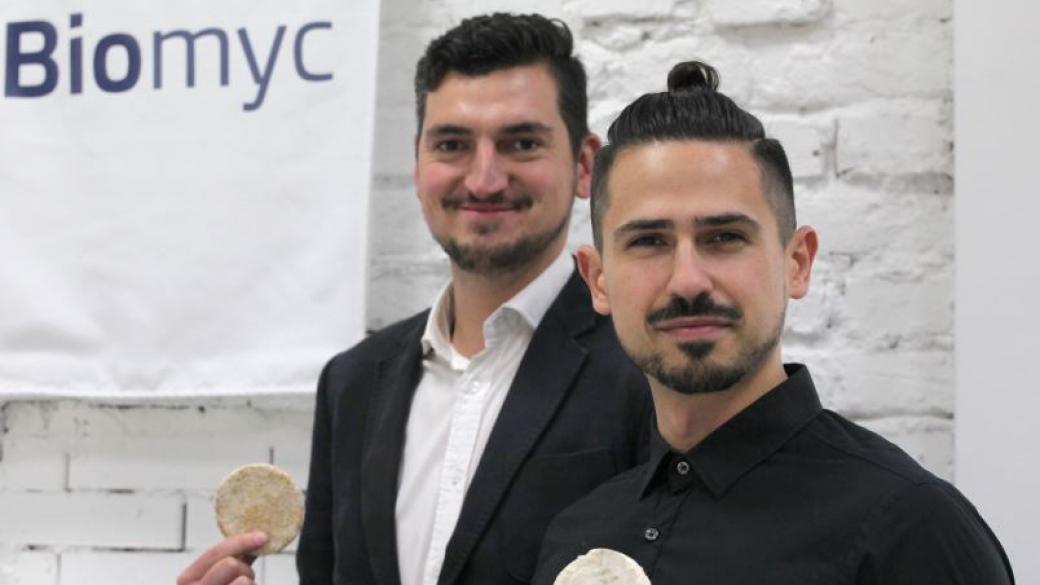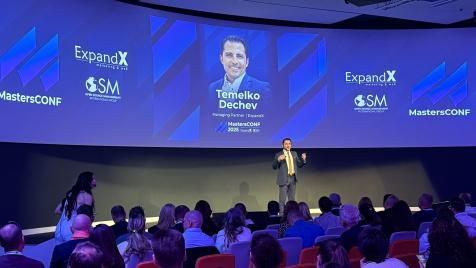Biomyc vs. Styrofoam
Or how entrepreneurs and scientists can find ecological alternatives together

© ECONOMIC.BG / Икономика/Красимир Свраков
Деян Георгиев (вляво) и Атанас Енев вярват в бъдещето без стиропор
Do you like playing with Styrofoam? If not you, then probably the children around you are happy to crumble the white balls of soft plastic from the packaging of the TV or the washing machine. Biomyc is a startup biotech company that offers an alternative to Styrofoam - a mixture of straw, sawdust and mushroom spawn. And, oh, surprise! While Styrofoam is not biodegradable in natural conditions and cannot be recycled, the eco-packaging is self-destructing in 75 days.
Deyan Georgiev and Atanas Enev, co-founders and managing partners at Biomyc, are working with the team of Professor Albert Krastanov - Head of the Department of Biotechnology at the University of Food Technology in Plovdiv, on the project that is more than business and more than science. It gives an opportunity for a future without Styrofoam.
“We are friends since our school years and decided to work together. We started with by participating in a competition for business ideas, where we managed to rank in the top 3. The process of finding the best science team took us over half a year. A close acquaintance recommended that we contact Prof. Krastanov,” Atanas says.
I saw them namely at that hackathon, in which they won the second prize and a bit of funding with something alive in a transparent container. Then, in the midst of the bustle of startup entrepreneurs with mobile applications, they stood out with their proposal of something really “green”, which could be applied in the trade and transport of wine and commodities (for packaging), furniture industry (instead of particleboard), in cosmetics, as building materials and even as an option for eco leather in the fashion industry.
“There is a great inconsistency between the way mankind produces and consumes. The origin of the materials and products we use is often unknown. We work hard to become leading providers of innovative and sustainable solutions. We believe in Bill Aulet's words: “Innovation = Invention x Commercialisation,” Deyan explains.
Biomyc has gone through accelerator programmes, managed to ensure funding for a lab, and this year won the prize in the Green Solutions category at the StartUp Europe Awаrds of Finnova Foundation with the support of the European Commission.
So much for the typical story of the startup, which is not yet 2 years old. The more interesting part is related to the development of Biomyc's idea. The company uses agricultural waste (straw, sawdust, etc.) and mushroom spawn (the root system of mushrooms) to create a composite material that is similar to Styrofoam. Thus, a product with high added value is formed from waste that is usually burned or disposed of. After use, it turns into nutrients, whether in soil or water. The last biodegradability tests of the material prove complete decomposition of the eco Styrofoam in no more than 75 days.
Atanas and Deyan started experimenting with coffee waste, aiming to use it as a substrate to put a mushroom spawn that people use to grow fresh mushrooms at home. But it turned out that the spawn developed by forming solid areas. The two of them were close to yelling Eureka, but it turned out that such a process is known to science, and the potential for developing the production technology is big enough to be worth trying. “The competition with the established petroleum-based products (plastics) is strong and it will continue to remain so in the coming years. Bio-based plastics are becoming an increasingly good alternative, despite the problems that accompany their use at the moment. We were looking for an initial market that would ensure us quick entry and high visibility. We have attracted strong interest from our first clients for protective packaging for premium and bio products - for wineries, wine merchants, organic cosmetics manufacturers. We help them to be one step ahead of the intensifying eco-regulations and the rising costs for using unsustainable materials (such as plastics),” Atanas explains.
The great advantage of the company is that it has a solid scientific research team, headed by one of the best Bulgarian biotechnologists - Prof. Albert Krastanov. His name is associated with the development of technologies for the production of probiotics and the application of enzymes in new aircraft coverings. The founders of the company and the research team join efforts to create working market products.
“We are making equal efforts both to secure long-term R&D funding and to sell pilot product series from our material. The progress in biological development leads to measurable business benefits. Ecological materials are expensive by definition; economically affordable materials are usually not a sustainable resource and are produced in remote countries. We aim to supply raw materials and produce materials locally, with short supply chains, and offer products from the circular economy,” Deyan explains.
The company aims to launch a pilot production of eco composite boards with 70% less wood, without synthetic adhesives, and with eco transport packages that are similar to Styrofoam. The first small prototypes of a furniture board with the eco Styrofoam filling were distributed as an advertising product at the Circular Economy Forum, part of the official programme of the Bulgarian Euro-Presidency. The sale of a pilot series of wine boxes is also being prepared. The big goal is to create a complete industrial production in no more than three years. And then, perhaps, the Styrofoam will come to its end.

